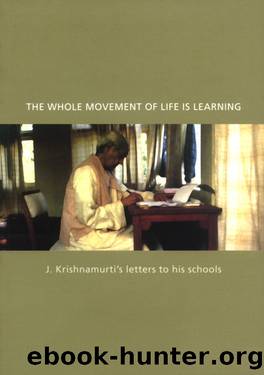The Whole Movement of Life is Learning: J Krishnamurti's Letters to His Schools by Jiddu Krishnamurti

Author:Jiddu Krishnamurti [Krishnamurti, Jiddu]
Language: eng
Format: epub
Published: 0101-01-01T00:00:00+00:00
36. REWARD AND PUNISHMENT
Action based on reward and
punishment brings about conflict
In all these letters we have been constantly pointing out that cooperation between the educator and the student is the responsibility of both. The word cooperation implies working together, but we cannot work together if we are not looking in the same direction with the same eyes and the same mind. The word same, as we are using it, under no circumstances implies uniformity, conformity or accepting, obeying, imitating. In cooperation with each other, working together, the student and the teacher must have a relationship which is essentially based on affection. Most people cooperate if they are building, if they are playing games, or are involved in scientific research, or if they are working together for an ideal, a belief, or for some concept which is carried out for some personal or collective benefit. Or they cooperate around a religious or political authority.
To study, learn, and act, cooperation is necessary between the teacher and the student. Both are involved. The educator may know many subjects and facts, but conveying them to the student becomes a struggle between the two if there is not the quality of affection. We are concerned not only with knowledge of the world but also with the study of oneself, in which learning and action are involved. Both the educator and the student are involved in this, and here authority ceases. To learn about himself, the educator is concerned not only with himself but with the student. In this interaction with its reactions, one begins to see the nature of oneselfâthe thoughts, the desires, the attachments, the identifications, and so on. Each is acting as a mirror to the other; each is observing in the mirror exactly what he is, because, as we pointed out earlier, the psychological understanding of oneself is far more important than gathering facts and storing them up as knowledge for skill in action. The inner always overcomes the outer. This must be clearly understood both by the educator and by the student. The outer has not changed man; the outer activitiesâphysical revolution, physical control of the environmentâhave not deeply changed the human being, his prejudices and superstitions. Deeply, human beings remain as they have been for thousands of years. Right education is to transform this basic condition. When this is really grasped by the educator, though he may have subjects to teach, his main concern must be with the radical revolution in the psyche, in the âyouâ and the âmeâ.
And here comes in the importance of cooperation between the two who are studying, learning and acting together. It is not the spirit of a team, or the spirit of a family, or identification with a group or nation. It is free inquiry into ourselves, without the barrier of the one who knows and the one who doesnât. This is the most destructive barrier, especially in matters of self-knowing. There is no leader and no led in this matter. When this is
Download
This site does not store any files on its server. We only index and link to content provided by other sites. Please contact the content providers to delete copyright contents if any and email us, we'll remove relevant links or contents immediately.
The Way of Zen by Alan W. Watts(5809)
Ego Is the Enemy by Ryan Holiday(4000)
The Art of Happiness by The Dalai Lama(3391)
The Book of Joy by Dalai Lama(3233)
Why Buddhism is True by Robert Wright(2833)
Shift into Freedom by Loch Kelly(2698)
Spark Joy by Marie Kondo(2686)
Happiness by Matthieu Ricard(2529)
A Monk's Guide to a Clean House and Mind by Shoukei Matsumoto(2409)
The Lost Art of Good Conversation by Sakyong Mipham(2129)
The Meaning of the Library by unknow(2073)
The Third Eye by T. Lobsang Rampa(1887)
The Unfettered Mind: Writings from a Zen Master to a Master Swordsman by Takuan Soho(1863)
Anthology by T J(1758)
Red Shambhala by Andrei Znamenski(1752)
The Diamond Cutter by Geshe Michael Roach(1675)
Thoughts Without A Thinker: Psychotherapy from a Buddhist Perspective by Epstein Mark(1596)
Advice Not Given by Mark Epstein(1524)
Twilight of Idols and Anti-Christ by Friedrich Nietzsche(1498)
